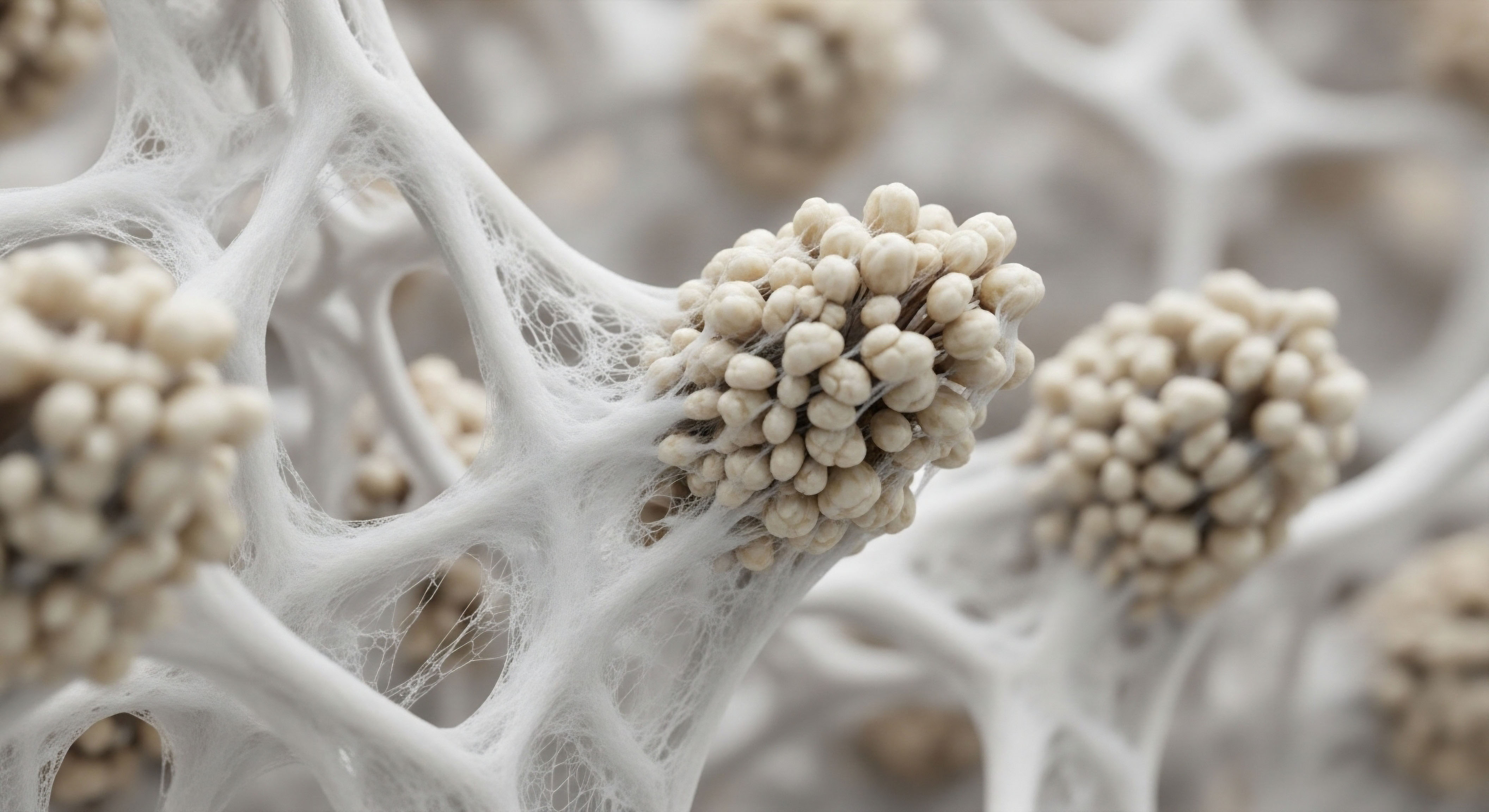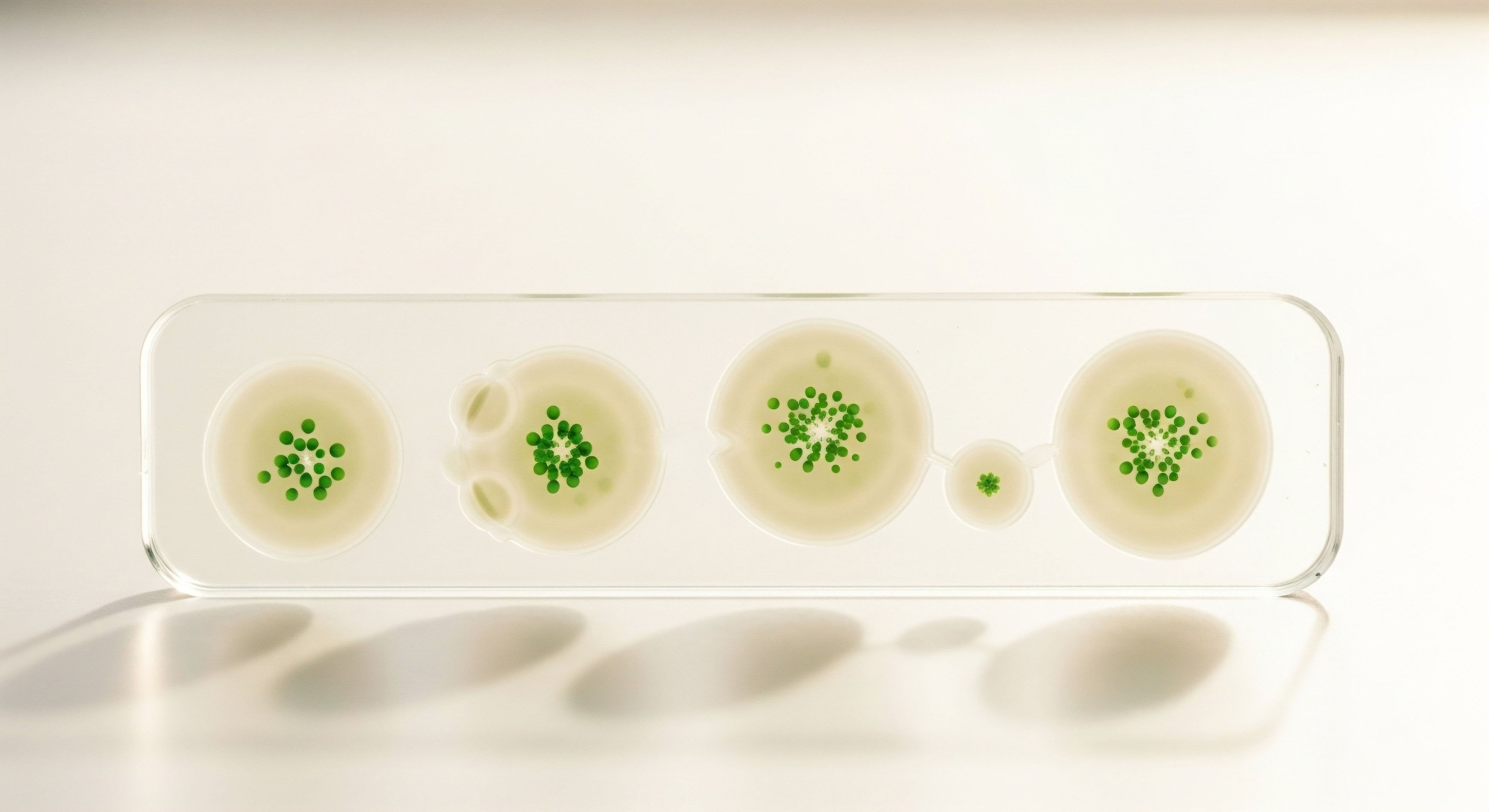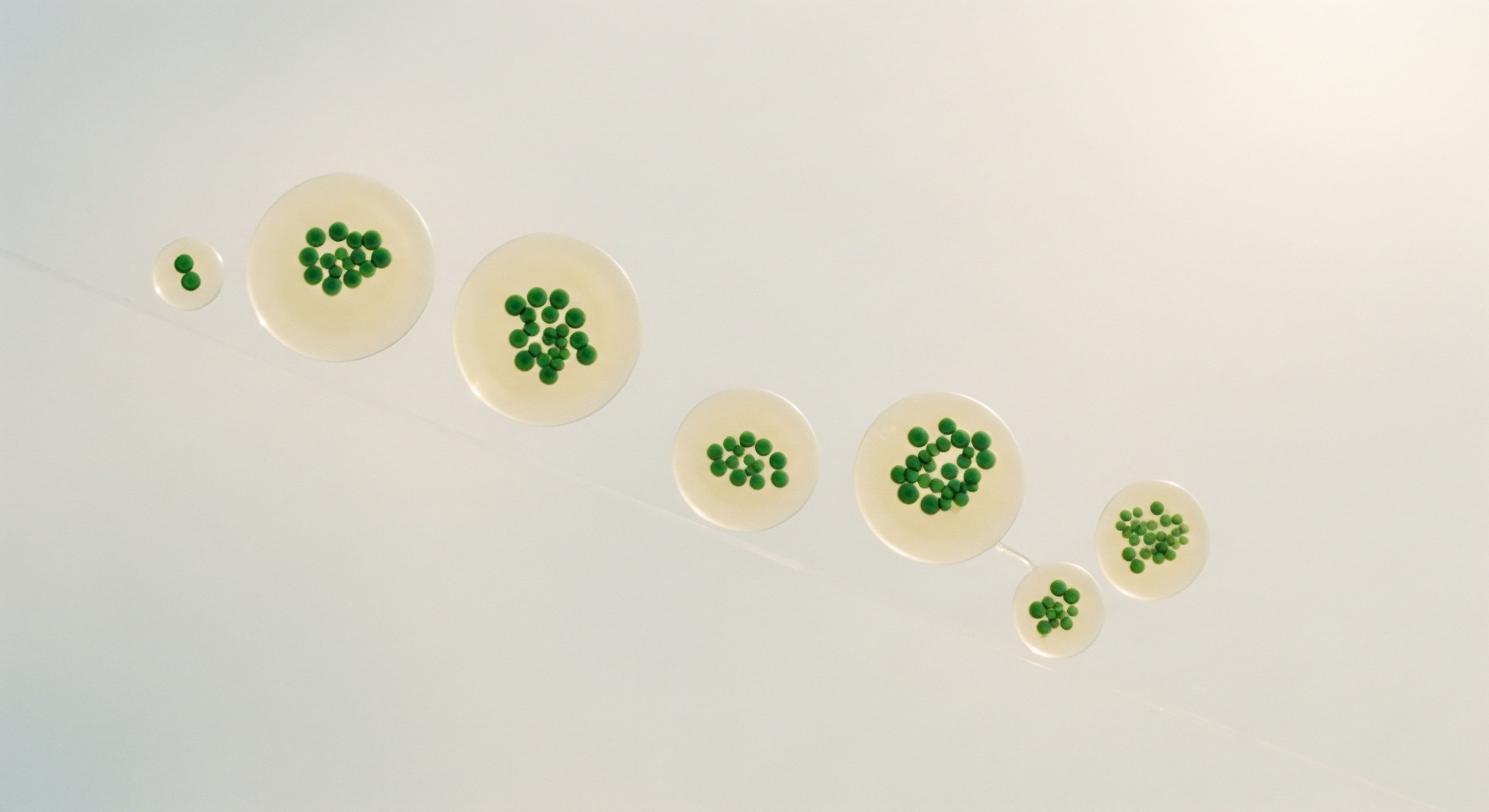

Fundamentals
You may have noticed subtle shifts in your cognitive world. Words that were once readily available might now linger just out of reach. The sharp focus you once commanded may feel softer, less defined. These experiences are common, and they are biologically real.
Your internal hormonal symphony, the complex interplay of chemical messengers that has directed your body’s functions for decades, is undergoing a significant transition. This recalibration has profound effects on your brain, the very seat of your consciousness and cognitive abilities.
Understanding this connection is the first step toward reclaiming your mental clarity. The brain is a profoundly responsive organ, rich with receptors for hormones like estrogen, testosterone, and progesterone. These molecules are not merely involved in reproduction; they are critical players in neuroprotection, neurotransmitter regulation, and synaptic plasticity ∞ the very processes that allow you to learn, remember, and think clearly.
When their levels change, as they do during perimenopause, andropause, or other life stages, the cognitive landscape can change as well.
Your personal genetic blueprint plays a decisive role in how your body and brain respond to these hormonal shifts and to therapeutic interventions.
This is where your unique biology enters the picture. The efficacy of any wellness protocol, especially one involving hormonal support, is deeply personal. Your genetic makeup dictates how your body metabolizes hormones, how sensitive your cellular receptors are to their messages, and even how you might respond to specific formulations of bioidentical hormone therapies.
Two individuals can follow the exact same protocol and experience vastly different outcomes. This is not a failure of the therapy, but a testament to the beautiful complexity of human individuality.

The Genetic Influence on Hormonal Pathways
Your DNA contains the instructions for building the proteins that manage your endocrine system. These proteins include the enzymes that synthesize and break down hormones, and the receptors that allow hormones to exert their effects on cells. Small, common variations in the genes that code for these proteins, known as single nucleotide polymorphisms (SNPs), can have a significant impact on their function.
For instance, a SNP in a gene for a hormone-metabolizing enzyme might cause that enzyme to work faster or slower than average, leading to different circulating levels of that hormone in your body.
Similarly, a SNP in a gene for a hormone receptor might alter the receptor’s shape, making it more or less responsive to its corresponding hormone. These subtle genetic differences can explain why some individuals are more sensitive to hormonal fluctuations than others, and why some may require different dosages or types of hormone therapy to achieve optimal cognitive benefits.
Recognizing this genetic dimension is essential for moving beyond a one-size-fits-all approach to hormonal health and toward a truly personalized strategy for cognitive wellness.


Intermediate
To appreciate how individual genetic variations can influence the effectiveness of hormone protocols for cognitive health, we must examine the specific biological mechanisms at play. The journey of a hormone, from its synthesis to its ultimate effect on a brain cell, is a multi-step process, and genetics can influence each step. This understanding allows us to move from a general awareness of genetic influence to a more precise, clinically relevant perspective.
The concept of a “critical window” for hormone therapy, particularly for women, highlights the importance of timing. Research suggests that initiating hormone therapy around the time of menopause may confer neuroprotective benefits that are not seen when therapy is started later in life.
This window of opportunity is likely influenced by the health of the brain’s hormonal receptors and the overall cellular environment, both of which are subject to genetic modulation. For men, the sensitivity of androgen receptors, which can vary genetically, plays a similar role in determining the cognitive response to testosterone optimization protocols.

Key Genes in Hormonal and Cognitive Health
Several genes have been identified as significant players in the relationship between hormones and cognition. Variations in these genes can help explain the diverse responses to hormone therapies. Here are some of the most well-studied examples:
- Apolipoprotein E (APOE) ∞ This gene provides instructions for making a protein that helps transport cholesterol and other fats in the bloodstream. The APOE gene comes in several different versions, or alleles, with the most common being APOE2, APOE3, and APOE4. The APOE4 allele is the strongest known genetic risk factor for late-onset Alzheimer’s disease. For women who carry the APOE4 allele, some studies suggest that estrogen therapy, particularly when initiated early in menopause, may be associated with better memory and larger brain volumes in key cognitive regions. This suggests a potential interaction between estrogen and the APOE4 gene in the context of brain health.
- Catechol-O-Methyltransferase (COMT) ∞ This gene codes for an enzyme that breaks down neurotransmitters like dopamine, particularly in the prefrontal cortex, a brain region crucial for executive functions like working memory and planning. A common SNP in the COMT gene results in two variants ∞ a “fast-acting” version (Val) and a “slow-acting” version (Met). Individuals with the Val/Val genotype tend to have lower baseline dopamine levels in the prefrontal cortex, while those with the Met/Met genotype have higher levels. Estrogen can inhibit COMT activity, thereby increasing dopamine levels. Consequently, for a woman with the Val/Val genotype, the estrogen boost from hormone therapy might optimize dopamine signaling and improve cognitive function. Conversely, for a woman with the Met/Met genotype who already has high dopamine levels, the same estrogen boost could push dopamine levels beyond the optimal range, potentially impairing cognitive performance.
- Androgen Receptor (AR) ∞ The AR gene contains a repeating sequence of three DNA building blocks ∞ cytosine, adenine, and guanine ∞ known as the CAG repeat. The length of this repeat can vary among individuals. Shorter CAG repeat lengths are associated with a more sensitive androgen receptor, meaning that it responds more strongly to testosterone. Longer CAG repeat lengths are associated with a less sensitive receptor. This genetic variation can influence how a man’s brain responds to testosterone replacement therapy (TRT). A man with a longer CAG repeat length might require a higher dose of testosterone to achieve the same cognitive benefits as a man with a shorter CAG repeat length. Some research has linked longer CAG repeats with lower scores on certain cognitive tests in older men.
The interplay between your genetic predispositions and your hormonal environment creates a unique cognitive profile that evolves over your lifetime.

Personalizing Hormone Protocols with Genetic Information
The growing understanding of these genetic factors is paving the way for more personalized hormone optimization strategies. While widespread genetic testing for this purpose is still in its early stages, the available research underscores the importance of a tailored approach. For example, a clinician might consider a patient’s APOE status when discussing the potential cognitive benefits of estrogen therapy. Similarly, understanding a man’s AR CAG repeat length could help in titrating his TRT dose for optimal cognitive outcomes.
The following table summarizes the potential influence of these key genetic variations on hormone protocol efficacy:
| Gene (Variation) | Hormone Interaction | Potential Impact on Cognitive Health and Protocol Efficacy |
|---|---|---|
| APOE (APOE4 allele) | Estrogen | For women with the APOE4 allele, early initiation of estrogen therapy may be associated with improved memory and larger brain volumes. The absence of this allele may mean a different risk-benefit calculation for hormone therapy. |
| COMT (Val158Met SNP) | Estrogen and Dopamine | Women with the Val/Val genotype (lower baseline dopamine) may experience greater cognitive benefits from estrogen therapy, while those with the Met/Met genotype (higher baseline dopamine) might see less benefit or even impairment. |
| AR (CAG repeat length) | Testosterone | Men with longer CAG repeats (less sensitive androgen receptors) may require higher doses of testosterone to achieve cognitive benefits from TRT. Shorter repeats may confer greater sensitivity to testosterone’s effects. |
This level of personalization moves us beyond simply replenishing hormone levels and toward a more sophisticated strategy of biochemical recalibration, one that respects the intricate and deeply personal nature of our biology.


Academic
The intersection of pharmacogenomics and endocrinology presents a compelling frontier in the optimization of cognitive health protocols. The efficacy of hormonal interventions is not a monolithic certainty but a probabilistic outcome, heavily influenced by the genetic architecture of the individual.
A deep dive into the molecular mechanisms reveals how specific genetic polymorphisms can alter cellular responses to exogenous and endogenous hormones, thereby dictating the therapeutic success or failure of a given protocol. This academic exploration will focus on the intricate interplay between the Apolipoprotein E (APOE) genotype and estrogen-based hormone therapy, a critical area of research with profound implications for neuroprotection in at-risk female populations.

The APOE Genotype and Estrogen Neuroprotection a Mechanistic View
The APOE gene is a key regulator of lipid transport and metabolism within the brain. The APOE4 allele, compared to the more common APOE3 allele, is associated with a host of neuropathological changes, including increased amyloid-beta deposition, tau hyperphosphorylation, and greater synaptic dysfunction.
These changes are hallmarks of Alzheimer’s disease, and women who carry the APOE4 allele have a higher lifetime risk of developing the disease than male carriers. This sex-specific vulnerability points to a critical interaction with the female endocrine system, particularly the decline of estrogen during menopause.
Estrogen exerts a wide range of neuroprotective effects. It promotes synaptic plasticity, enhances cerebral blood flow, reduces oxidative stress, and modulates the inflammatory response. However, the presence of the APOE4 protein appears to blunt some of these beneficial actions.
For example, APOE4 can interfere with estrogen’s ability to support mitochondrial function and can promote a pro-inflammatory state that counteracts estrogen’s anti-inflammatory properties. This creates a biological context in which the menopausal loss of estrogen can be particularly detrimental for APOE4 carriers.
The timing of estrogen intervention in APOE4 carriers appears to be a critical determinant of its neuroprotective efficacy, a concept known as the “critical window hypothesis.”
The “critical window hypothesis” posits that initiating estrogen therapy during perimenopause or early postmenopause, when neuronal architecture is still relatively intact, can help preserve cognitive function in APOE4 carriers. During this period, estrogen receptors in the brain are still abundant and responsive.
Early intervention may help to counteract the negative effects of APOE4 by maintaining synaptic health, preserving mitochondrial function, and mitigating the neuroinflammation that APOE4 can exacerbate. In contrast, initiating estrogen therapy later in life, after a prolonged period of estrogen deficiency and potential APOE4-mediated damage, may be ineffective or even detrimental. This highlights the importance of a proactive and personalized approach to hormonal health, especially for individuals with known genetic risk factors.

Clinical Evidence and Protocol Considerations
Several studies have provided evidence supporting the modulatory role of APOE genotype on the cognitive effects of hormone therapy. A study published in Alzheimer’s Research & Therapy found that in a cohort of women at risk for Alzheimer’s disease, hormone therapy use was associated with better memory scores and larger brain volumes in key cognitive areas, but only in those who carried the APOE4 gene.
Another study in the journal PLOS ONE reported that in healthy postmenopausal women, carrying the APOE4 gene was associated with accelerated biological aging at a cellular level, but this effect was absent in carriers who were on hormone therapy.
These findings have significant implications for clinical practice. For a woman entering menopause, knowledge of her APOE genotype could be a valuable tool in the shared decision-making process regarding hormone therapy. For an APOE4 carrier, the potential for cognitive protection might weigh more heavily in the risk-benefit analysis.
The choice of hormone formulation may also be relevant. Some research suggests that bioidentical estrogens, such as 17-beta estradiol, may have a more favorable profile for brain health than synthetic estrogens.
The following table presents a summary of findings from key studies investigating the interaction between APOE genotype and hormone therapy:
| Study/Source | Key Findings | Implications for Clinical Practice |
|---|---|---|
| Saleh et al. Alzheimer’s Research & Therapy (2023) | In women at risk for Alzheimer’s, hormone therapy was associated with improved memory and larger brain volumes specifically in APOE4 carriers. | Suggests that APOE4 status may identify a subgroup of women who are most likely to derive cognitive benefits from hormone therapy. |
| Jacobs et al. PLOS ONE (2013) | APOE4 carriers showed signs of accelerated cellular aging, but this was mitigated in those on hormone therapy. | Provides a potential mechanism (slowing cellular aging) for the neuroprotective effects of estrogen in APOE4 carriers. |
| The KEEPS Trial | Found no overall cognitive benefit of hormone therapy, but in APOE4 carriers, bioidentical hormones were associated with lower levels of beta-amyloid plaques. | Highlights the potential importance of hormone formulation and suggests that even in the absence of overt cognitive improvement, hormone therapy may have beneficial effects on underlying Alzheimer’s pathology in APOE4 carriers. |
This level of evidence-based personalization represents the future of hormonal wellness. It moves beyond generalized recommendations and toward a nuanced understanding of how an individual’s unique genetic makeup can be leveraged to design the most effective and protective health strategies. The conversation about hormone therapy for cognitive health is no longer just about if, but for whom, when, and how.

References
- Saleh, R. N. M. et al. “Hormone replacement therapy is associated with improved cognition and larger brain volumes in at-risk APOE4 women ∞ results from the European Prevention of Alzheimer’s Disease (EPAD) cohort.” Alzheimer’s Research & Therapy, vol. 15, no. 1, 2023, p. 10.
- Rasgon, Natalie, et al. “Accelerated biological aging evident in women with Alzheimer’s risk factor, but inhibited by hormone therapy, researchers say.” Stanford Medicine, 13 Feb. 2013.
- Yaffe, Kristine, et al. “Androgen receptor CAG repeat polymorphism is associated with cognitive function in older men.” Biological Psychiatry, vol. 54, no. 9, 2003, pp. 943-6.
- Panizzon, Matthew S. et al. “Genetic Variation in the Androgen Receptor Modifies the Association between Testosterone and Vitality in Middle-Aged Men.” The Journal of Sexual Medicine, vol. 17, no. 12, 2020, pp. 2351-2361.
- Jacobs, Emily, and Mark D’Esposito. “Estrogen shapes dopamine-dependent cognitive processes ∞ implications for women’s health.” Journal of Neuroscience, vol. 31, no. 14, 2011, pp. 5286-93.
- Asthana, S. et al. “High-dose estradiol improves cognition for women with AD ∞ results of a randomized study.” Neurology, vol. 57, no. 4, 2001, pp. 605-12.
- Ryan, J. et al. “The effect of APOE genotype on the association between hormone therapy and cognitive function ∞ a systematic review.” Maturitas, vol. 79, no. 1, 2014, pp. 56-66.
- Henderson, Victor W. “Alzheimer’s disease ∞ review of hormone therapy trials and implications for prevention and treatment.” Geriatrics, vol. 60, no. 5, 2005, pp. 30-4.
- Zandi, P. P. et al. “Hormone replacement therapy and incidence of Alzheimer disease in older women ∞ the Cache County Study.” JAMA, vol. 288, no. 17, 2002, pp. 2123-9.
- Tripathi, K.D. Essentials of Medical Pharmacology. 8th ed. JP Medical Ltd, 2018.

Reflection
The information presented here offers a glimpse into the intricate biological systems that govern your cognitive vitality. It provides a framework for understanding why you feel the way you do, grounding your personal experiences in the elegant logic of physiology and genetics. This knowledge is a powerful tool, shifting the narrative from one of passive endurance to one of active, informed participation in your own health journey.
Consider the unique symphony of your own biology. What are the subtle cues your body is sending you? How might your personal history and genetic inheritance be shaping your present experience? The path to optimal wellness is not about finding a universal cure, but about embarking on a personal investigation. It is a process of learning your body’s language, of understanding its unique needs, and of discovering the precise inputs that will allow it to function at its peak.

What Is Your Next Step?
This exploration of genetics and hormonal health is a starting point. The true work begins when you take this knowledge and apply it to your own life, in partnership with a clinical guide who can help you interpret your body’s signals and navigate the complexities of personalized medicine.
Your biology is not your destiny; it is your starting point. The journey to reclaiming your cognitive function and overall vitality is a deeply personal one, and it is a journey you have the power to direct.



